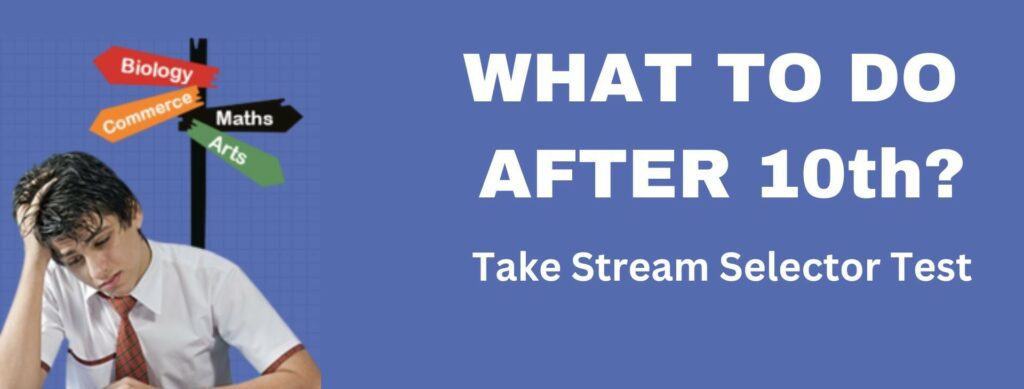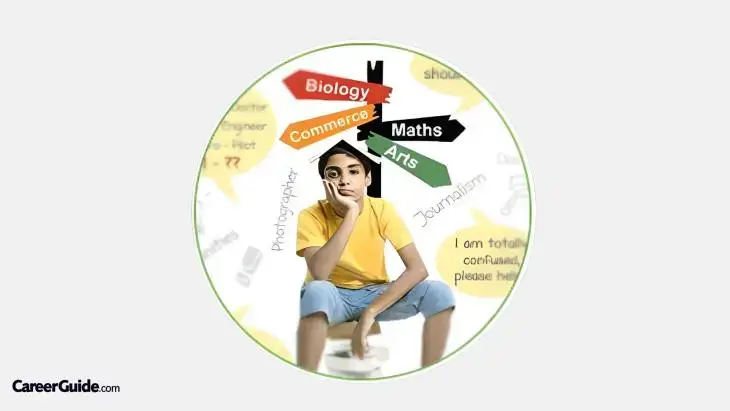A career in medicine is a popular choice among Class 10th students who are interested in helping others and making a difference in people’s lives. It is a challenging yet rewarding field that offers a wide range of opportunities to those who pursue it. Let’s have a look upon frequently asked questions career in medicine for class 10th students.
- How do I know if a career in medicine could be for me?
- How am I able to know that I’m the proper quite person for a medical career?
- How do I choose the proper school for Higher education (10+2) to enter Medical education?
- What subjects I should study at Higher Secondary Education (10+2) to study Medicine and become a Doctor?
- What is medical school/college like? I hear it’s long and tough. How long? How tough?
- What is a doctor’s career like?
- STREAM SELECTOR™ TEST
To become a doctor, one needs to first complete their 10+2 education with Physics, Chemistry, and Biology as their core subjects. After that, they have to qualify for medical entrance exams such as NEET, AIIMS, or JIPMER to get admission in medical colleges. Medical education is typically five years long, followed by a one-year internship. After that, doctors can specialize in various fields by pursuing a postgraduate degree.
How do I know if a career in medicine could be for me?
First, ask yourself what type of future appeals to you. Do you want challenges, opportunities, a chance to make a difference? Many bright and motivated college students describe their “dream career” with the following characteristics:
Opportunity to serve: This allows you to help people.
Action: Doesn’t tie you to a desk all the time.
Respect: You are an important part of your community.
Security: Allows you a good living with a secure future.
Excitement: Changes daily, so it’s hardly ever boring.
Mobility: You’re in demand wherever choose to live.
Flexibility: Gives you a lot of career options from the same education base.
How am I able to know that I’m the proper quite person for a medical career?
Do I care deeply about people, their problems, and their pain? Do I enjoy helping people with my knowledge and skills? Do I enjoy learning, gaining new understanding? Do I often dig deeper into a topic than my teacher requires? Do I understand the worth of learning beyond just making good grades? Am I curious about how the physical body functions? Am I intrigued by the ways medicine are often wont to improve life? If you answered “Yes” to most of those questions, likelihood is that you’ve got the proper quite personality for a medical career.
How do I choose the proper school for Higher education (10+2) to enter Medical education?
Your career guidance counsellor or teacher can assist you find the answers. you furthermore may should consult any college admission guidebook found in your school’s guidance office, local libraries, and bookstores. Does the varsity have an honest faculty and a reputation for top academic standards? Is it accredited? Does it have strong science faculty with good laboratory facilities?
Does it offer all the specified courses I want for acceptance to medical school?
Does it have a good track record for having its students accepted to medical school?
Does it offer extracurricular activities that appeal to me? Are there programs to do volunteer work at local hospitals or clinics?
As you select a school/college remember that just as in high school, good liberal art education is a key ingredient to becoming a physician along with science subjects. You’ll need a strong foundation in mathematics and the sciences that relate most to medicine: biology, general chemistry, organic chemistry, and physics. But your college experience needs to be broad. Knowledge in the humanities or liberal arts will help you prepare for the “people” side of medicine.
What subjects I should study at Higher Secondary Education (10+2) to study Medicine and become a Doctor?
You should study Physics, Chemistry, and Biology in (10+2) to study Medicine and become a Doctor. Whether you want to do MBBS (Allopathy) or BHMS (Homeopathy) or BUMS (Unani) or BAMS (Ayurvedic), you must study Physics, Chemistry, and Biology at (10+2) to become a doctor.
What is medical school college like? I hear it's long and tough. How long? How tough?
One of the important truths is “things that come easily usually aren’t worth much.” Medical school/college is challenging. If you want to take responsibility for people’s health and well-being, you’ve got to be serious about learning. Once you’ve been accepted, the medical school faculty and staff will do everything they can to help you succeed. More than 97 percent of students entering medical obtain their M.D. degrees.
The curriculum at many medical schools/colleges has changed in recent years.
However, here’s a general, quick look at what you can expect during four/five years of medical school.
During the first two years, you will study the basic sciences-anatomy, biochemistry, physiology, microbiology, pathology, and pharmacology as well as behavioural sciences. You’ll also begin learning the fundamental techniques of taking a medical history and examining patients. Next, you’ll go into the hospital and various clinics to observe and work with experienced doctors and begin to learn how to take care of patients. At this time, you’ll begin to explore the wide variety of career paths within medicine, such as family practice, internal medicine, surgery, psychiatry, obstetrics, and gynaecology, and paediatrics.
Your final years are spent continuing your contact with patients and doctors in a clinical setting while taking elective courses.
After medical school/college, you will spend three to seven years in a residency, where you will gain further experience and training in the specialty you have chosen. You already may have an idea of which specialties interest you; however, it’s good to keep an open mind until your third year of medical school.
Medical school/college usually lasts four/five years. In general, during the first two years, you study the sciences basic to medicine: anatomy, biochemistry, physiology, microbiology, pathology, and pharmacology, as well as behavioural sciences: introductory patient interviewing and examination techniques; and an introduction to health care. In the third year, you gain experience with patients in hospitals, clinics, and office settings in the fields of internal medicine, family medicine, paediatrics, obstetrics and gynaecology, surgery, and psychiatry. The fourth-year is a mix of required and elective courses where you gain additional experience caring for patients. Each medical school differs in how it organizes its educational program.
Medical school/college is tough. A lot will be demanded of you, both in the volume of information, you will be expected to master and the rate at which you will be expected to learn. You will need good study habits and time management skills, as well as a strong academic background. You will also be required to be aware of and tap into the tremendous support, guidance, and mentorship that medical school faculty and staff provide to help you succeed. Medical schools are committed to their students and education. In general, more than 95 percent of all students enrolled succeed in earning their M.D. degree.
Towards the end of medical school, you will choose a specialty: after graduation you will spend at least three years in a graduate medical education (residency) program. During that period, you must obtain a license to practice.
What is a doctor's career like?
Few fields offer a wider variety of opportunities. Most doctors’ professional lives are filled with caring for people and continuously learning more about the human body. Every day in communities around the country, doctors work in neighbourhood clinics, hospitals, offices, even homeless shelters and schools to care for people in need. But physicians also do many other things. Physician researchers are at work today developing exciting new treatments for cancer, genetic disorders, and infectious diseases like AIDS. Academic physicians share their skills and wisdom by teaching medical students and residents. Others work with health maintenance organizations, pharmaceutical companies, medical device manufacturers, health insurance companies, or corporations directing health and safety programs. People with medical skills are in demand everywhere.
What does it take to become a doctor?
To become a doctor, you typically need to complete a bachelor’s degree, followed by medical school. After medical school, you will undertake a residency program in your chosen specialty. The entire process can take around 10-15 years, depending on the specialty.
What are the different types of doctors?
There are various specialties and subspecialties in the medical field. Some common types of doctors include general practitioners, pediatricians, surgeons, psychiatrists, cardiologists, oncologists, and neurologists, among many others.
How long does it take to become a doctor?
The time it takes to become a doctor can vary depending on the country and the specific path you choose. Generally, it takes around 10-15 years of education and training after completing high school.
What are the essential skills and qualities needed to be a successful doctor?
Some important skills and qualities include strong scientific knowledge, critical thinking, problem-solving abilities, empathy, communication skills, attention to detail, adaptability, and the ability to work in a team.
What are the typical job responsibilities of a doctor?
Doctors are responsible for diagnosing and treating illnesses and injuries, providing medical advice and guidance to patients, conducting physical examinations, ordering and interpreting diagnostic tests, performing surgeries (if specialized), keeping medical records, and staying updated with medical advancements.
STREAM SELECTOR™ TEST
Stream Selector™ is a test designed to help students choose their academic stream for higher education based on their interests, abilities, and personality. The test assesses students’ aptitude in various areas such as science, commerce, humanities, and engineering, and helps them identify the academic stream that best aligns with their strengths and preferences. The Stream Selector™ test is typically conducted online, and it consists of multiple-choice questions designed to gauge the student’s abilities and interests. The questions are designed to be easy to understand and cover a broad range of topics such as logical reasoning, numerical ability, verbal ability, and spatial reasoning. The test is usually timed, and students are given a specific time to answer all the questions. Once the test is completed, the results are analyzed, and a report is generated. The report provides a detailed analysis of the student’s aptitude, interests, and personality and suggests the most suitable academic stream for the student. The report also includes information on the various career options available in the suggested stream and provides guidance on how to pursue higher education in the recommended field. Visit careerguide.com now
What is the stream selector test by CareerGuide?
The stream selector test by CareerGuide is an online aptitude test designed to help class 10th students identify the most suitable stream for their higher studies.
Is the stream selector test by CareerGuide reliable?
The stream selector test by CareerGuide is based on a scientifically validated methodology and has been developed by a team of experts with years of experience in career guidance. The test is designed to assess a student’s interests, personality traits, and academic strengths and weaknesses, and has been used by thousands of students to make informed career choices.
How can I interpret the results of the stream selector test by CareerGuide?
The report generated by the stream selector test by CareerGuide provides a detailed analysis of your interests, personality traits, and academic strengths and weaknesses, along with recommendations for the most suitable stream. It is important to review the report carefully and seek guidance from a career counselor if needed to make an informed decision.













